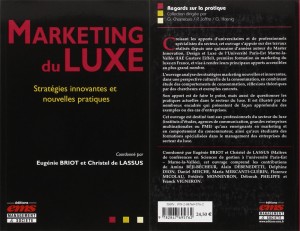CSUN Business Prof Wins 2015 Best Business Book of the Year in France

Franck Vigneron
As a college student, Franck Vigneron, now a marketing professor at California State University, Northridge, was intrigued by the influence branding activities had in creating and maintaining the appeal for luxury goods — whether it was the sleek designs of Louis Vuitton or the sporty features of a Lamborghini.
At the time, many researchers painted consumer marketing with a broad brush, asserting that the same tactics used to sell dishwashing soap and laundry detergent could be applied to sell haute couture and fine wines. Vigneron was not so sure, and he entered what was then a new field of study — the marketing of luxury goods.
His latest work, a book co-authored with other specialists in the field at Paris universities, was published in French in 2014. “Marketing du Luxe (Luxury Marketing)” has just been named the 2015 Best Business Book of the Year in France by the Paris Chamber of Commerce.
“This is quite an honor,” said Vigneron, a French native who has been a member of CSUN’s marketing faculty since 2000. This accolade has been given annually in France since 1962 to recognize business books that represent the greatest contribution in advancing the business body of knowledge.
“I started working in 1993 in the field of luxury marketing,” he said. “I have been most interested in studying the differences and similarities between branding luxury versus nonluxury efforts. What does this mean? This field of research was marginal 22 years ago, but it is today a significant business subject with, for instance, 31 MBA programs in the world specialized in luxury management. Luxury items account for more than $950 billion in sales worldwide. It’s nice today to see that I might have made a good decision to work years ago on something that I had passion for, even though not many people seemed to pay attention to it. Things change!”
 The Paris Chamber of Commerce was established by Napoléon Bonaparte in 1803. The best business book selection also was made by the Académie Française de Sciences Commerciales, which was established in 1957.
The Paris Chamber of Commerce was established by Napoléon Bonaparte in 1803. The best business book selection also was made by the Académie Française de Sciences Commerciales, which was established in 1957.
When Vigneron first expressed an interest in studying luxury marketing in the early 1990s, the only people who seemed to be interested in the subject were the French writing in their native language, which he said made sense given that so many luxury items were made in France.
“The thing was, what research there was was written in French for a French audience,” he said. “I was studying in England at the time. What interested me was that many of these luxury goods had an international appeal, but there was very little out there in English or any other language.”
Vigneron saw an opportunity to explore a new aspect of marketing and decided that he would publish his work in English. That decision was a revelation, he said, and it helped shape his research. Today, he is regarded as a pioneer in the field.
“Most people see a topic through the culture they were raised in,” he said. “When I was reading in French and writing in French, I was thinking a certain way. But now when I research and write in English, I think in a different way. When I study a subject, a lot of the culture perceptions — or perhaps misperceptions — fall away, and I am able to look at the subject in a whole new way, and a way that helps improve my research. It is like I am the combination of two different people conversing with one another. At the end, it allows me to have a broader viewpoint.”
His research on the motivations of luxury brand consumers has gained international attention. In 2007, Vigneron was honored with the Academy of Marketing Science Review’s Best Paper of the Decade award.
He pointed out that true luxury items are like fine art — unique, individualized pieces created by craftsmen who take pride in their work and wish to convey a certain image. He noted that many of the most elite brands are still family-owned and highly controlled, as family members work to preserve the integrity and reputation of the line.
“Those companies target a certain clientele, often by word of mouth,” he said. “For instance, there are some designers who create pieces that are so unique that they are one-of-a-kind. Their customers pay thousands of dollars for a piece that they may never wear, but instead store in a highly controlled warehouse.”
Then there are some luxury brands that become so successful that they are eventually bought by large corporations, hoping to expand the product’s availability while capitalizing on the brand’s reputation.
“It’s how the new company handles the brand that is so interesting,” Vigneron said. “Marketing of luxury goods is now a global industry, where France still plays an important role in manufacturing and where the USA is about 45 percent of the world consumption.
“There are customers and manufacturers of luxury goods all over the world, from China to the Middle East to the United States and Europe,” he said. “Whether that Rolex is real or a fake, people desire luxury goods, and we now realize that you don’t sell Lexus the same way you would sell Toyota.”
This means the question is, “How do you do it?” Vigneron said. He is working on a newer version of his work, in English this time, to broaden the opportunity to reach people.

 experience
experience